



.jpg)
Le mausolée ou tombeau de Tu Duc (en vietnamien: Lang Tu Duc) est le lieu que l'empereur Tu Duc -qui règna sur l'empire d'Annam (aujourd'hui Viet Nam) de 1848 à 1883 - fit construire pour sa sépulture future.
En fait, il fut enterré à Hué dans un autre lieu tenu secret.
Le mausolée, qui servait également de résidence de campagne, se trouve à six kilomètres au sud-ouest de l'ancienne ville impériale de Hué. Il s'appelait le domaine de Khiem du vivant de l'empereur.
Le tombeau de Tu Duc est l’un des plus impressionnants tombeaux royaux de Hué et il s’élève dans un cadre naturel enchanteur.
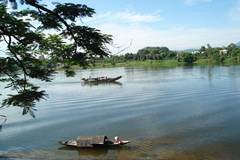
La rivière des Parfums (Sông Hương) tire son nom des nombreuses herbes médicinales qui poussaient sur ses rives. Nombreux villages de sampans avec leurs petits autels et les offrandes sur le toit, à l’intention des génies de l’eau. La...
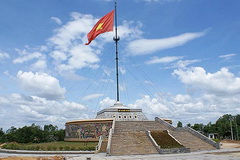
It is commonly known as a flagpole, but viewed from the Imperial City; it is really a huge structure of three flat-top pyramids, one lying on top of another. It was built during Emperor Gia Long's reign, in 1807, and later improved by his son, Emperor Minh Mang.According to the Thuc Luc...
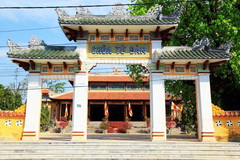
Tu Dam Pagoda was designed following the model of a Conference Pagoda (Chua Hoi). The old and new architectures blend together creating spacious and harmonious elements.Tu Dam Pagoda is one of the biggest and oldest pagodas in Hue. The pagoda was founded at the end of the 17th century (in about...
.jpg)
Pagoda was built in the shape of the Chinese character "Khau" (mouth), with the main building consisting of three rooms and two wings. It faces the southeast and uses Ngu Binh Mount as a front screen.The pagoda was originally a small hut built by Nhat Dinh in 1843, who was formerly recognized by...
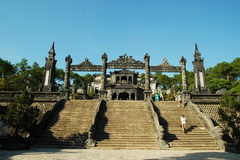
De tous les tombeaux impériaux qui jalonnent la rivière des Parfums, le mausolée de l’empereur Khai Dinh, l’avant-dernier souverain de la dynastie des Nguyên (1802-1945), est le plus étonnant, son architecture étant totalement différente...
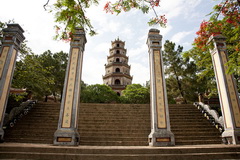
La pagode de la Dame céleste (en vietnamien: Chùa Thiên Mụ) est la pagode la plus haute du Viêt Nam avec les six étages supérieurs de sa tour, dénommée « Source de félicité ». Elle se trouve à Hué sur...

The tomb of Gia Long is in fact a group of tombs including those of the Emperor's relatives. The whole compound is spread on a joint mountain with 42 small and big mounts, amongst which Dai Thien Tho is the biggest.To visit Gia Long's tomb, tourists can go by boat about 18km along...
.jpg)
Établie comme capitale du Viet Nam unifié en 1802, la ville de Huê a été non seulement le centre politique mais aussi le centre culturel et religieux sous la dynastie Nguyên, jusqu'en 1945. La rivière des Parfums serpente à travers la...
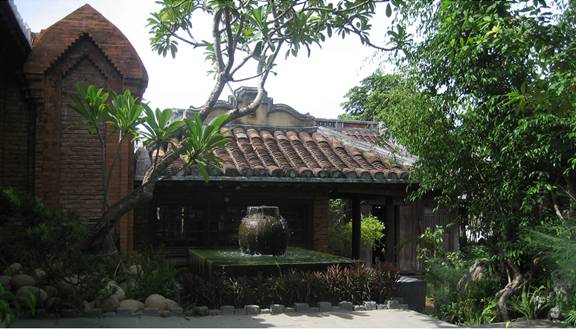
Travelling to Hue you may look for some corners where still keep remain it owns culture, architecture and a traditional food let visit Phuoc Tich ancient village with old house architectures, 500 years old temple and a collection of ceramic relics which are strong reflection of Hue culture....
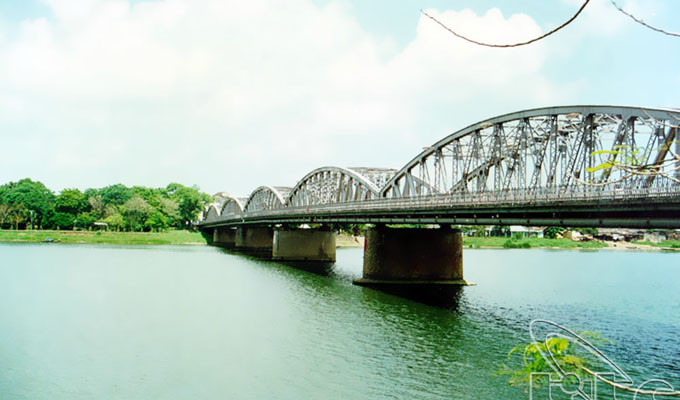
Huê ne serait pas la même sans la rivière Huong ou rivière des Parfums et le mont Ngu Binh, qui confèrent à l’ancienne cité des rois un cadre harmonieux et romantique. Une combinaison d’éléments indissociables que savent...

Soyez le premier à connaître nos offres de voyage exclusives et les nouveaux circuits !.